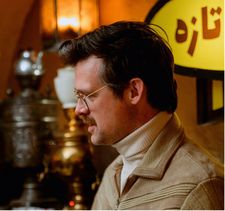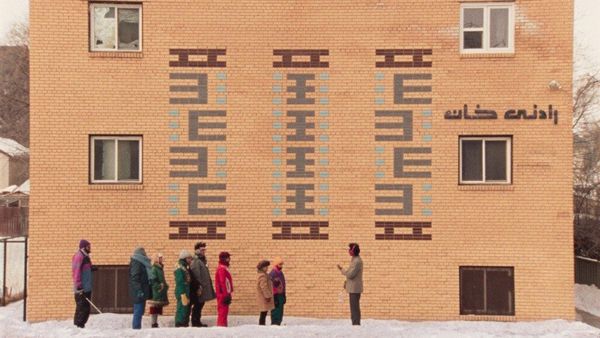Universal Language is a world of its own. Perfectly poised somewhere between Tehran and Winnipeg, the dialogue mostly unfolds in Farsi although it's set in the snowy environs of Canada. Matthew Rankin – who previously made inventive faux biopic The Twentieth Century – was inspired by the children’s films of the Kanun Institute in Iran, as well as by stories from his own family. His film unfolds as part children’s adventure, part absurdist comedy after the lives of two children (Saba Vahedyousefi and Rojina Esmaelli) who find a banknote frozen in the ice intersect in unexpected ways with a number of adults, including a character named Matthew Rankin (and played by the director), who is visiting his ailing mother, and a tour guide (Pirouz Nemati, who co-wrote the film), whose stop-offs of interest are less than scintillating. A film that is all about transience and connection, as well as being poignant and a lot of fun, it has been on a strong festival run, including recently at Tallinn Black Nights . We caught up with Rankin earlier in the year when it screened at Thessaloniki Film Festival to talk about working in Farsi, keeping everything under control, liminal spaces and why a child’s perspective is so important.
How was it to write this in Farsi, because you’re a long-term learner of that. I presume you must be pretty good by this point if you started learning it in your twenties.
Matthew Rankin: Yes, I’ve been learning Farsi in kind of slow motion. I've been to Iran just one time, I spent three months there. That was my first encounter of Farsi. I've tried to return repeatedly to really immerse myself. But it's really tricky for Canadians to travel to Iran now. So I have been learning as best I can. I can read Farsi, I can write it. I can have simple conversations.I can't have an abstract philosophical conversation in Farsi by any means.
So how was it to write the script then because a lot of what you’re dealing with here is abstract?
MR: Well, I wrote it with two collaborators who are Farsi speakers and who grew up in Iran, Ila Firouzabadi and Pirouz Nemati. Essentially, how the writing worked was I kind of mapped out the story. From there, it became sort of a conversation between the three of us and a lot of the humour in the film is an expression of our friendship. It was a very organic process. Even during the filming of it, we were still discovering scenes and writing them very quickly.
It sounds to me as though you enjoy the collaborative element.
 |
| Matthew Rankin: I'm a big believer in that you should always make films with your friends – people you love and who you really connect with |
This is a very controlled film. The environment is controlled, and there are multiple intersecting storylines. Even the press notes – where you interview yourself – are quite controlled.
MR: Yeah. In the press notes, I interviewed myself because they wanted a celebrity to interview me. This went on forever and they couldn't find a celebrity who was willing to talk to me. So, I said, ‘Well, why don't I just write something, I could just interview myself. The movie also has an autobiographical element, so I thought, maybe that makes sense to have me interviewing me – I thought that would be absurd.
It certainly fits the tone, but the film is quite rigorous on some level.
MR: It’s interesting you say that. Yeah, it's true. I feel like when we were shooting it, we had a very loose touch. But I guess it’s a little bit true. We didn't do a lot of coverage. Once we figured out how to film it, how to cover the action, how to block it, I really did commit, so it was kind of like, ‘It's this and this, and this, and that'll be the scene’. With that commitment, you have to kind of know it’s going to work because the looser way would be to film from all angles and then you have to figure it out. But we also left a lot of space.
There were these spontaneous moments that happened while we were filming and oftentimes, we would go off and improvise little scenes. And of course, because I act in the film, you can't control that so much. I can't be behind the camera and in front of it at the same time. So the vibe on the set was, I would say, pretty loose. You can't control everything and what I love about filmmaking is its collaborative nature.
As much as this might be a personal film on a lot of levels – the stories do come from my own life, my family and my memories and my dreams and this kind of thing – it’s also something in which all of the creative collaborators who made it with me, were really expressing themselves.
As most of the actors are close friends the script was kind of adjusted for them and their personality. There is a certain rigor to that aesthetic and mise en scene but the process of making it was a very organic one.
I was struck by how liminal this film is. It’s an imagined meeting place between Canada and Iran and there are a lot of in-between spaces and a lot of travelling from one place to another rather than being in a concrete spot. But also it’s emotionally liminal as well, particularly for the character who is going to see his mother.
MR: That’s right, it is an in-between space. I think that's how we live. As much as the structures that we build try to contain us and organise us into these departments and sectors, I feel like our experience in the world is not like that. Our experience of the world is infinitely more fluid than the binaries that, you know, our politicians, and our Instagram bubbles and our structured ideologies have assigned us. That's also part of the visual design and visual aesthetic that you’re describing. There's a lot of brutalism. It's this idea that there would be all these brutal walls, containing things but there would be people flowing between them, there's water and rivers, and people, and tears, and ice and snow and tea. All of these things are sort of flowing. I feel like this contrast between the rigid and the fluid is a liminal zone that is interesting to me.
Each one of us is at a point of intersection between many stories and many ways of being and we are somehow connected and that’s kind of amazing. We're all alive here together at the same time, for a very limited period of time and that's really kind of the most precious thing. If we don’t spend our time encountering one another, we’d miss something.
Is that why building it around a children’s adventure was appealing? Because I always think children are much less binary in the way that they view the world, their imagination doesn’t feel as restricted as ours. Reality and hyperreality and absurdity, they don’t categorise them, they just move through those ideas.
MR: I do think that's true. Largely speaking, I think there is a wisdom to children that adults lose sight of. The children's story comes from a story my grandmother told me. She grew up in Winnipeg in the depression and she and her brother found this two dollar bill frozen in the ice on the pavement and they went on the city-wide Odyssey to get it out.
When I later discovered these Iranian films produced by the Kanun Institute, a lot of them are children's fables. They’re very poetic, very humanist films, and they're usually about children, facing adult dilemmas and sort of encountering a more desperate, more structured, more rule-based, more rigid adult world. Usually, the story is about the discovery of personal responsibility or our duty to other people and always the children kind of display a wisdom that is lost on their elders.
What I really loved and was sort of the seed for the whole film is how this story from my octogenarian grandmother, who would spend her whole life in Winnipeg, found this echo in these Iranian films on the other side of the world. That connection touched me and appealed to my own kind of idealistic longing for a deeper sense of human connection and belonging.
Children are simultaneously much more straightforward than adults but also more flexible – I’m not sure how they do that but it’s a neat trick, if only we could hang on to it.
MR: It’s a measure of how we are innately capable of that flexibility, open-heartedness and generosity, and we should take that seriously.
Universal Language will be released on January 24 in the US






















